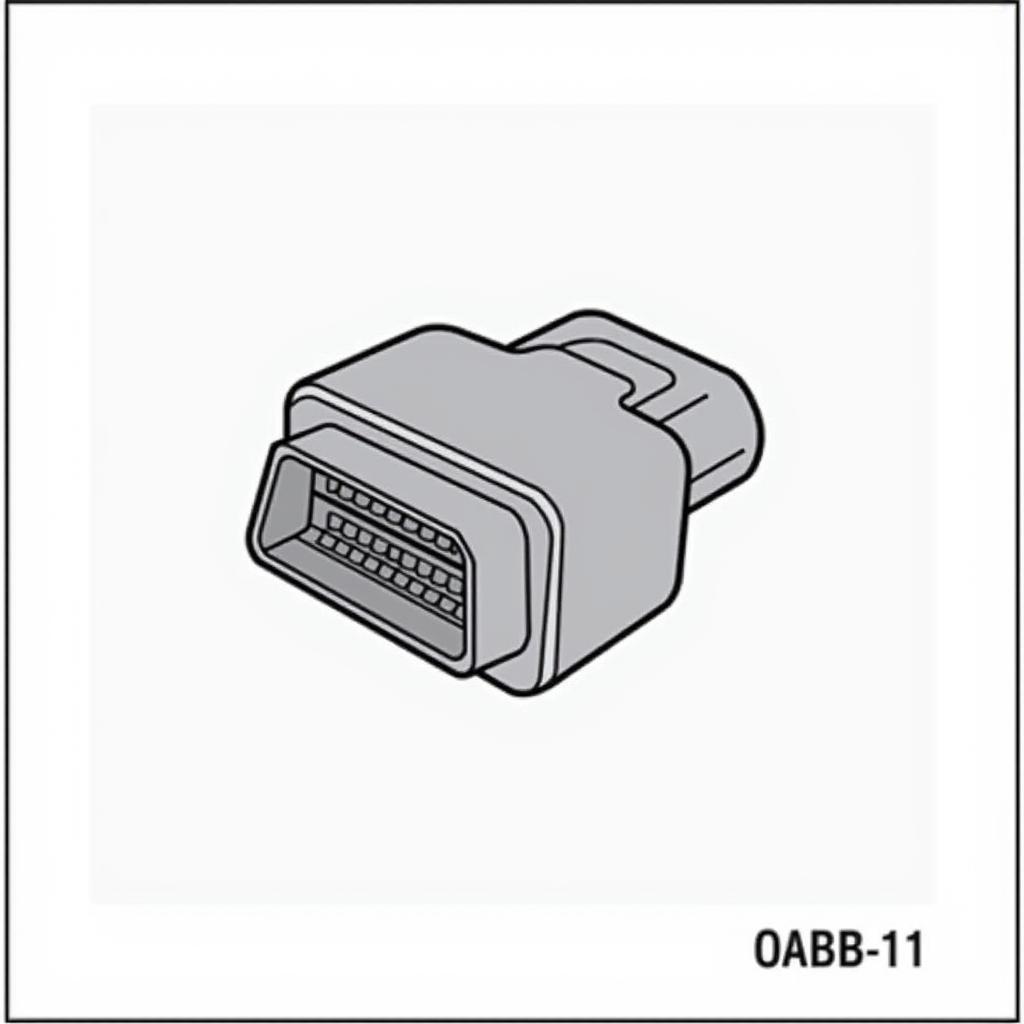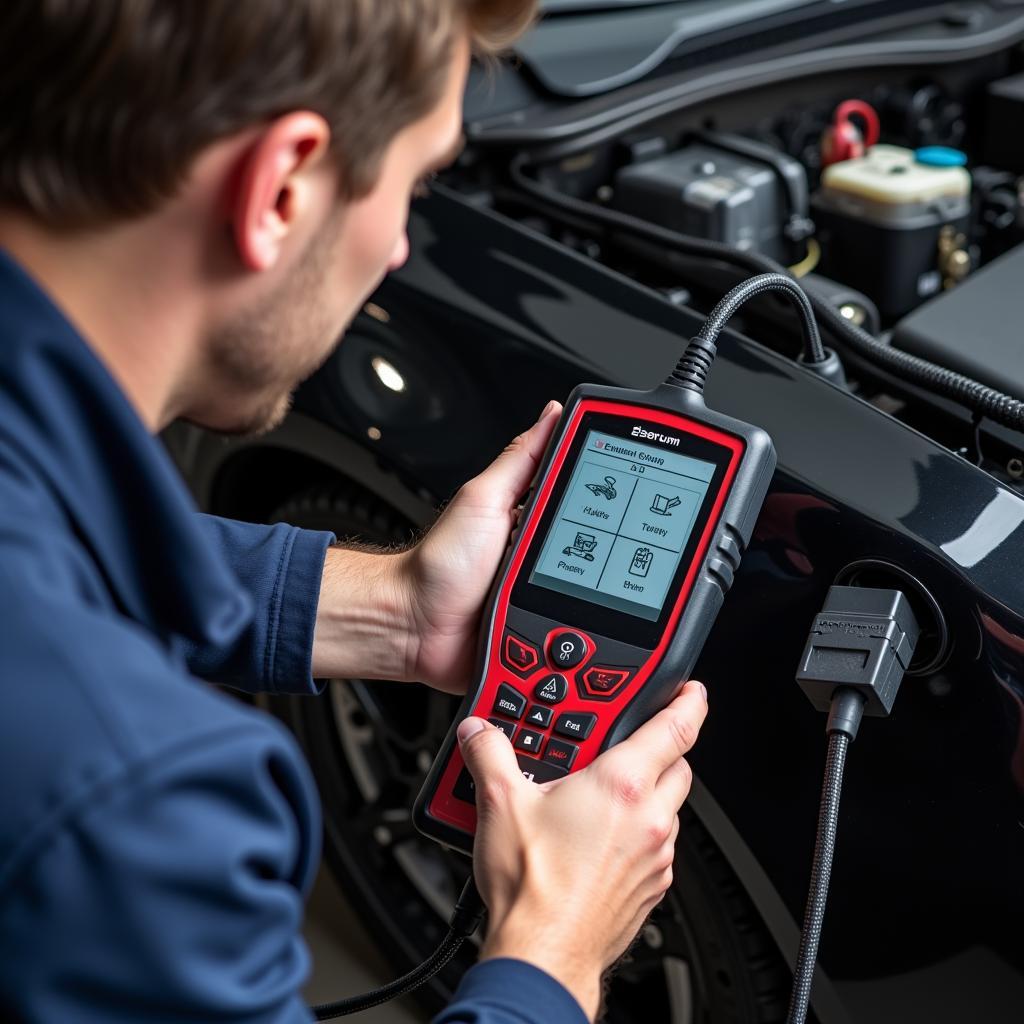Have you ever wished you could talk to your car diagnostics and instantly know what’s wrong? While we haven’t quite achieved telepathy with our vehicles yet, modern car diagnostic tools are getting pretty close! These tools act as translators, decoding the complex signals your car sends and providing valuable insights into its health.
Decoding the Jargon: What Does “Talk to My Car Diagnostics” Even Mean?
In essence, “talking to your car diagnostics” means accessing the onboard computer system that monitors various aspects of your vehicle’s performance. This system continuously collects data from sensors located throughout your car, tracking everything from engine speed and fuel efficiency to tire pressure and airbag status.
 Car Diagnostic Port Under Dashboard
Car Diagnostic Port Under Dashboard
The OBD-II Port: Your Gateway to Car Communication
At the heart of this communication lies the OBD-II port, a standardized connector found in most cars manufactured after 1996. Think of it as your car’s data download point. When you plug in a car diagnostic tool, whether it’s a handheld scanner or a mobile app paired with a Bluetooth adapter, it taps into the OBD-II port to retrieve diagnostic trouble codes (DTCs) and other vital information.
Why Should I “Talk” to My Car Diagnostics?
“Talking” to your car diagnostics can be incredibly beneficial for car owners and mechanics alike. Here are a few key advantages:
- Early Problem Detection: Diagnosing issues early can save you from costly repairs down the line.
- Improved Performance: Understanding your car’s data can help you optimize its fuel efficiency and performance.
- DIY Repairs: For the mechanically inclined, access to diagnostic information allows for some DIY troubleshooting and repairs.
 Mechanic Using Diagnostic Tool on Car
Mechanic Using Diagnostic Tool on Car
Car Diagnostic Tools: From Basic Scanners to Advanced Software
A variety of car diagnostic tools are available, catering to different needs and budgets:
- Basic Code Readers: These affordable handheld devices primarily retrieve and display DTCs.
- Advanced Scan Tools: Used by professional mechanics, these tools offer in-depth data analysis, live sensor readings, and even the ability to reprogram certain vehicle modules.
- Mobile Apps: Paired with a Bluetooth OBD-II adapter, these apps transform your smartphone or tablet into a portable diagnostic tool. They often provide a user-friendly interface and additional features like trip logging and fuel cost tracking.
If you’re looking for a reliable car diagnostic service in Rugby, consider checking out our car diagnostic rugby page for more information.
Understanding Diagnostic Trouble Codes (DTCs)
DTCs are standardized codes that indicate specific areas where your car’s system has detected a problem. For instance, the code “P0301” signals a misfire in cylinder 1. While DTCs provide a valuable starting point for diagnosis, it’s important to note that they don’t always pinpoint the exact cause of the issue.
Beyond the Codes: Interpreting Data and Seeking Expert Help
While basic code readers can be helpful for identifying simple problems, interpreting the full range of data from your car’s diagnostics often requires more specialized knowledge. If you encounter a complex issue or are unsure about interpreting the diagnostic information, it’s always best to consult with a qualified mechanic.
Worried about getting ripped off with your car diagnostics? Our [car diagnostic rip off](https://diagfixpro.com/car-diagnostic-rip off/) page offers tips and advice to help you avoid common scams and ensure you’re getting a fair deal.
Talk to Your Car Diagnostics: Empowering Car Owners
The ability to “talk to your car diagnostics” empowers car owners with knowledge and control. By understanding the information your car provides, you can make informed decisions about maintenance, repairs, and even your driving habits. Whether you choose a simple code reader or a more sophisticated diagnostic tool, proactively monitoring your car’s health can lead to a smoother, safer, and potentially more affordable driving experience.
FAQs About Talking to Your Car Diagnostics
Q: Can I damage my car by using a diagnostic tool?
A: Using a reputable diagnostic tool correctly poses minimal risk to your car. However, it’s essential to follow the manufacturer’s instructions carefully.
Q: Do all cars have an OBD-II port?
A: Most cars manufactured after 1996 have an OBD-II port. However, the location of the port may vary.
Q: Can I fix any car problem myself using a diagnostic tool?
A: While diagnostic tools can help identify issues, they don’t provide a magic fix. Some repairs require specialized knowledge and equipment best left to professionals.
Curious about the cost of a diagnostic check for your car? Visit our diagnostic check car cost page for a detailed breakdown of pricing and factors that can influence the cost.
Need Mobile Car Diagnostic Services in Bristol?
We understand that car troubles can be inconvenient. That’s why we offer mobile car diagnostic bristol services to diagnose and troubleshoot issues right at your location.
Car Won’t Read Diagnostics?
Experiencing difficulties getting your car to communicate with diagnostic tools? Our car wont read diagnostic page provides insights into common causes and potential solutions for this frustrating problem.
Remember, “talking” to your car diagnostics is like having a conversation with your car. The more you understand its language, the better equipped you are to keep it running smoothly for years to come!

Leave a Reply